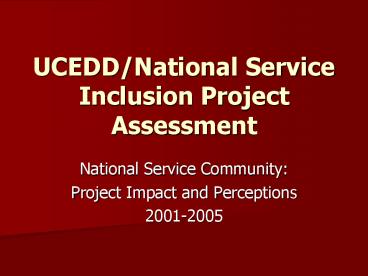UCEDDNational Service Inclusion Project Assessment - PowerPoint PPT Presentation
Title:
UCEDDNational Service Inclusion Project Assessment
Description:
The National Service Inclusion Project (NSIP) at the Institute for Community ... CNCS oversees AmeriCorps, Learn and Serve America, and National Senior Service Corps. ... – PowerPoint PPT presentation
Number of Views:34
Avg rating:3.0/5.0
Title: UCEDDNational Service Inclusion Project Assessment
1
UCEDD/National Service Inclusion Project
Assessment
- National Service Community
- Project Impact and Perceptions
- 2001-2005
2
Introduction
- The National Service Inclusion Project (NSIP) at
the Institute for Community Inclusion/UCEDD,
University of Massachusetts Boston, is a training
and technical assistance provider on the
inclusion of people with disabilities for the
Corporation for National and Community Service
(CNCS) working in collaboration with the
Association of University Centers on Disability
(AUCD). - CNCS oversees AmeriCorps, Learn and Serve
America, and National Senior Service Corps.
These federally supported programs provide US
citizens with various opportunities to improve
their communities through service in the areas of
the environment, education, public safety,
homeland security, and other critical areas.
3
2001 Knowledge Assessment
- A knowledge assessment was originally conducted
by the NSIP team in the fall of 2001. The data
collected at that period was obtained to measure
the level of information and knowledge that the
University Centers possessed on National Service
and CNCS. In addition, the assessment served as
way to identify the needs of the University
Centers in order to successfully implement the
National Service Inclusion Project throughout the
AUCD Network. Results of the original needs
assessment can be reviewed at http//www.aucd.org/
projects/NSIP/NSIPSurveyResults_files/frame.htm.
4
Purpose of 2005 Assessment
- Nearly four years have passed and thirty-one
UCEDDs and one LEND program have chosen to join
the National Service Inclusion Project. In the
2005 assessment, the instrument was developed to
determine the awareness and current activities of
national and community service programs within
the UCEDD network. - In addition, the information collected from this
on-line instrument will assist NSIP staff
personnel in identifying potential funding
opportunities for UCEDDs and LEND Programs
currently providing training and technical
assistance in the area of National Service.
5
Assessment Methodology
- The 2005 assessment was available online and the
collection of quantitative and qualitative data
from participants was submitted electronically. - All 61 UCEDDs and 35 LEND programs within the
AUCD Network were sent invitations to complete
the 2005 assessment. - Comparisons from the 2001 and 2005 assessments
have been used to determine the impact of the
National Service Inclusion Project on the centers
and programs in terms of their familiarity with
the National Service structure, entities, and
philosophy.
6
Comparison of 2001 and 2005 Response Rates
- In 2001, a total of 52 UCEDDs and LEND programs
participated in the original assessment. - A total of 49 UCEDDs and LEND programs
participated in the 2005 assessment
7
Knowledge of CNCS, programs, mission
8
Knowledge of CNCS, programs, mission
9
Knowledge of Philosophical Concepts of National
Service
10
Knowledge of Philosophical Concepts of National
Service
11
Knowledge of CNCS State Office
12
Knowledge of CNCS State Office
13
Knowledge of State Commission Office
14
Knowledge of State Commission Office
15
Knowledge of Service Projects Engaging
Individuals with Disabilities in Their State
16
Knowledge of Service Projects Engaging
Individuals with Disabilities in Their State
17
Has the UCEDD/LEND program ever provided any
training and technical assistance to a
CNCS/National Service program in the state or
neighboring state(s) regarding disability issues?
18
Has the UCEDD/LEND program ever provided any
training and technical assistance to a
CNCS/National Service program in the state or
neighboring state(s) regarding disability issues?
19
Would the UCEDD/LEND program accept a mini-grant
designed to provide training and technical
assistance to CNCS programs within the state and
surrounding areas?
20
Conclusions from the 2001 and 2005 Assessments
- The National Service Inclusion Project has
increased the UCEDDs and LEND programs knowledge
and familiarity in all areas of National Service
pertaining to the structure, existing entities,
philosophy, and current available projects. - More UCEDDs and LEND programs are currently
involved with providing disability training and
technical assistance to National Service entities
within their states than in 2001. - Interest in obtaining funding from the National
Service Inclusion Project remains high within the
AUCD Network with an 87 favorable response in
2005 compared to a 98 in 2001.































